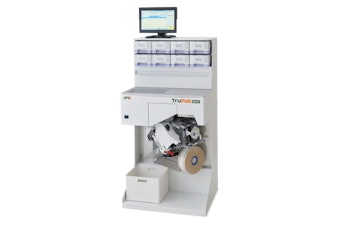With the EU Falsified Medicines Directive (FMD) and Drug Supply Chain Security Act (DSCSA) deadlines now passed, many companies are looking for the value beyond compliance.
At FutureLink Barcelona 2019 in June, the discussion around serialization will shift from a focus on compliance and discuss the value of digital information sharing and how serialized data can be used to improve communications with partners and patients.
The event takes place June 11-13, where leaders from across the life sciences industry will gather to explore the future of healthcare delivery and how serialized data can drive innovation, transform business operations and improve patient outcomes.
We spoke to one of the members of the event’s advisory board, Naseem Amin, CEO at GMP-Orphan (as well asa qualified medical doctor, a graduate from the Royal Free & University College Medical School, London) and asked him a few questions about serialization compliance and how he thinks the industry will change in the coming years.
Healthcare Packaging (HCP): What have been some of the challenges for your organization when it comes to the FMD?
Naseem Amin: We’re a niche player working with incredibly small volumes of drugs when compared to some of the "big" pharmaceutical manufacturers. Our most advanced product candidate is Cuprior for the treatment of Wilson’s Disease and we only have around 1,000 patients across Europe at any one time. As such, we’re manufacturing very small volumes of a drug.
While the implementation of an FMD-compliant solution with the support of vendors such as TraceLink was necessary, it was also a resource- and capital-heavy investment so we’ve had to figure out ways to make more of our investment.
HCP: What value initiatives are you exploring then?
NA: One of the key areas we are looking into is how we can use data to help patients and physicians monitor adherence and communicate this information through the ecosystem of care that surrounds each of our patients in a compliant manner.
There are some regulatory requirements/barriers, for instance we can’t go directly to the European Medicines Verification Organisation (EMVO) and see when serial numbers are removed for which patient, but it would be extremely useful for pharmacists and physicians to have a mechanism to correlate prescribing by physicians, dispensation to patients and actual usage by patients. Our patients have a debilitating life-threatening disease, if they aren’t adhering to their treatment, it’s a big problem. Most pharmacists are seeing only one patient and if we could determine each pharmacist’s dispensation rate, we could inform the physicians if patient refilling of their prescription is not correct suggesting they aren’t adhering. This would need to be done while maintaining patient confidentiality.
We’re also looking into supply chain logistics. As mentioned, we work with incredibly small batches, so knowing when pharmacists order and repeat order our product helps production planning and batch timing.
HCP: How can serialization benefit patients?
NA: A digital information sharing network and data that serialization provides will be key for us in the future.
When it comes to rare diseases, misdiagnosis is common – Wilson’s Disease patients often get told they have liver disease or a mental health disorder because of the symptoms involved and it often takes years to correct this, a delay which can prove fatal.Genetic diseases, where mutations cause the problem, often run in families. With access to serialized data, we can work with physicians to identify locations where there are pools of patients and distribute targeted communications and help improve diagnosis, access to treatment, and improve disease awareness.
Beyond that, we also need to provide pharmacists with the information they need to help patients with their care. When it comes to chronic diseases that have been diagnosed, pharmacists often see patients more than physicians do. They need to be able to access medical information from manufacturers using the digitalized network and share information with patients – it’s also key that they can communicate with manufacturers and report any adverse events as part of Pharmacovigilance responsibilities. All of this data is incredibly important and will improve patient outcomes across the board.
We’re in a microcosm at GMP Orphan, but our goals translate to anyone involved in the ecosystem of treating rare or chronic diseases.
Upcoming FutureLink events
To learn more about the upcoming events, visit FutureLink Barcelona (June 11-13, 2019) and FutureLink Nashville (Oct. 2-4, 2019).The events gather leaders from across the life sciences industry to reimagine the future of healthcare delivery and how data-driven innovation is transforming business and patient outcomes. Keynote speakers will offer insight into the next wave of commercial, operational, and clinical care breakthroughs that are revolutionizing the industry.























